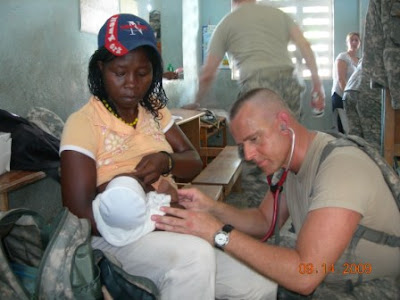I went to Jacmel with the task of overseeing the volunteer translators and arranging referrals for surgery and other care that was beyond the scope of the US Army medical team. However, by the end of my very first day on the ground, it was obvious that my job was a little bit more than just a coordinator.


I arrived in Marigot, the small town an hour out of Jacmel where the Army was holding its first 5 days of clinic in an elementary school. When I got there, work was already under way, so I walked through and quickly introduced myself to each room. There was dental, optometry, pediatrics, women's and family health, general medical, and the pharmacy. At each stop, I just stuck my head in and offered my name and my role as volunteer and referral coordinator. I think most of them immediately forgot about me as they went back to work.
Twenty minutes later, all work stopped for the opening ceremony. The soldiers stood at attention as the Haitian flag was raised and the Haitians sang their national anthem. Then the Master of Ceremonies asked for the US flag and anthem. Major Heck, standing near me, whispered, "We don't have anyone who can sing. We're in trouble!" Jokingly, I said, "Well, gosh, I can sing." And of course, next thing you know, I'm standing in front of the podium leading the Army in the Star Spangled Banner.


It didn't stop there. The speeches began and I asked the Master of Ceremonies, who is fluent in English, French and Creole, if she was going to translate so the soldiers could understand. "No," she said, with a wicked grin. "You are!" So I had the joy of translating speeches made by the judge of Marigot, the mayor of Marigot, the representative of the Southeast department of Haiti, and a high ranking official with the Minister of Health. The poor soldiers were standing in 90 degree heat for the entire ceremony, so I tried to keep my English versions short - OK, that's really an excuse for the fact that I simply could not remember everything that each official has said in his 10 minute speech even though I took notes. You can see from the expression on my face how thrilled I was to be translating those speeches!


Needless to say, everyone knew who I was by the end of the opening ceremony.
Later in the day, I was approached by one of the docs asking if there was anywhere in the area to get more powerful pain medications. One of the medics has a back injury and was in excruciating pain. For security reasons, the soldiers were not allowed outside the compound without an armed escort, but I could walk around freely. I went down the street to the local pharmacy and bought valium for the medic. Over the next 4 days, I visited the pharmacy at least once a day for different requests, but usually for valium, both for the soldier and for a seizing patient.


My reputation for being able to make the impossible happen was cemented that afternoon when a man appeared at the gates with his hand wrapped in bloody cloth. He had been in a machete fight. The slice went between his pinky and ring fingers, all the way through his palm and into his wrist. I won't post the photos because they are too graphic, but his pinky finger and palm could be turned almost 180 degrees to his hand. If we sent him to the hospital, most likely, he would not be able to have it surgically repaired and he would lose the hand and maybe die from infection. But we had a plastic surgeon in our unit! If we could only get our hands on the supplies needed to do the surgery, he could do it.
I went to the local clinic and spoke with the director. He allowed us to use the clinic's sterile gloves and sutures, while we borrowed lidocaine from the dentists and sterile water from our pharmacy. It took over an hour, but Dr Pitman and his assistant Andy did a masterful job putting that hand back together.



That was it. In one day, I became the go-to person for all questions and needs out of the ordinary. And I loved it!













































